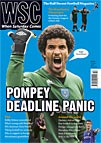 As Ian King observes, the media now defines football supporters by their fanatical behaviour. Is this encouraging some to behave in an increasingly irrational, negative and anatagonistic manner?
As Ian King observes, the media now defines football supporters by their fanatical behaviour. Is this encouraging some to behave in an increasingly irrational, negative and anatagonistic manner?
When the retail chain Sports Direct (SD) makes news it is usually in connection with their owner, Mike Ashley. But in mid-August several newspapers carried the story of a man who went to an SD store and spent £55 on a replica Man Utd shirt. He decided to have “YSB” (which stands for “You Scouse Bastards”, apparently), “96” and “Not Enough” printed on the back of it. He then posted pictures of his purchase on Facebook. Sports Direct say that they will now only allow the printing of current players’ names on their shirts and that the sales assistant who had the design made up didn’t understand it. This line was not accepted by Margaret Aspinall of the Hillsborough Support Group: “I don’t believe it is possible someone printing football shirts wouldn’t know what the message meant.”
It’s worth trying to see into the mind of the person who had this shirt made for him, because he is a symbol of a phenomenon that has developed over the last couple of decades – the culture of taking football far too seriously. Within the space of about five years in the early 1990s, it was decided that football matters. Not matters in the sense of wanting our team to win and being disappointed if they don’t, but matters in the sense that we have to live, breathe and absorb the game through osmosis if possible.
“Supporters”, people that got behind their teams, became “fans”, a contraction of the word “fanatic”, devoid of reason and blinded by their own prejudices. The popular cliche of the football supporter went from a drunken, knife-wielding maniac to a man with at least 50 replica shirts, a hat, a scarf and a cat named after his club’s greatest-ever player. Of course, it isn’t that this sort of fanaticism didn’t exist before the Premier League, but it suits the media and the clubs for people to be fanatics, for they are a captive audience.
Sky Sports just have to say “We know how you feel, because we feel the same” then expect hundreds of millions of pounds to come rolling in. The clubs, meanwhile, stock their shops with tat in the expectation that people will lap it up and the fact that football club megastores still exist would seem to demonstrate that they do.
Of course, there are strong arguments to say that these are fairly harmless activities and that people should be able to spend their money as they wish, but this isn’t where the spread of fanaticism ends. In the world of the fanatic, it is starting to become apparent that merely supporting your team isn’t enough. Even loving your team isn’t really enough. These days, you can’t be a real fan unless you hate your rivals as much as you love your own team.
This doesn’t merely mean that you just want your lot to beat them and that maybe you dislike them a little bit. It’s not even enough, apparently, to hate their players or their manager. You have to hate the club, its players, its supporters and the city that it comes from. Or the part of the city, if they come from the same city as your team. You have to hate them so much that, if you support Man Utd, you wish that more than 96 Liverpool supporters had died in British football’s worst disaster, and you’d want to advertise the fact this is your opinion by putting it on a replica shirt. Also, you wouldn’t even be able to bring yourself to call them “Liverpool”. You’d spit “Scouse bastards” at them instead. Meanwhile, internet forums and messageboards have become centres for what could effectively be called “cyber-hooliganism”, with rival supporters heading for each other’s sites with the express intention of taunting or being abusive, often shouting down more reasoned debate as they do.
It should go without saying that this isn’t a problem specific to Man Utd supporters, or indeed followers of the major names in the Premier League. There are “fans” at every club who are likely to be just as vituperative. For every “Scouse bastard”, there is a “Munich”, a “Hun”, “Bitter Blue” or a “Scummer”. Worst of all, the fanatic is bad for the rest of us. Our world sinks a little when a story like this becomes public. He allows clubs to push up ticket prices by five to ten per cent per year when inflation is at 1.5 per cent and still falling. He drowns out more sensible opinionwith his braying rage and, above everything else, he is what a large number of people that don’t care about football at all think we are all like.
With the people that may once have been re-garded as extremists being the most likely to be heard, there seems to be less space for nuanced debate and friendly rivalry. As a result, football is a little more difficult to enjoy for the rest of us. Meanwhile, the fanatics bluster happily on, seemingly blissfully unaware of an inconvenient truth: that even Man Utd and Liverpool supporters have more in common than between them.
From WSC 272 October 2009